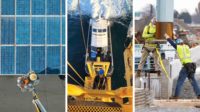The forecaster noted that London's population is growing, and the city faced a housing and infrastructure deficit.
Despite China’s drop-off, the emerging Asian market still will lead the world in construction growth, averaging 5.6% annually between 2014 and 2030, says the report. But India will outstrip it through 2030, growing between 6% and 10% per year.
The report also sees growth in the Middle East-North Africa region, although oil price declines have prompted Saudi Arabia to “trim back its infrastructure spend by 2020,” said Robinson.
In Latin America, Mexico should expect “much higher growth rates” due to global manufacturing investment and a housing backlog, Robinson noted. By contrast, Brazil’s growth rate was halved since 2013, due to corruption scandals and lack of productivity reforms, the new report says.
Conference speakers acknowledged ethics challenges. Winston Villagomez, engineering manager at Brazil-based Odebrecht S.A., noted pressures as “projects become politicized because they have to be completed in a set period. There is always corruption.”
H. Kit Miyamoto, CEO of California-based global earthquake response engineer Miyamoto International, said, “As a U.S. firm, there are certain projects we can’t touch.” Selim Bora—president of Turkey’s Summa Group, which works extensively in sub-Saharan Africa—said it often has insufficient time to “check out” local subcontractors that the local officials want on a project.
Broadened View
Michael S. Burke, chairman and CEO of AECOM, outlined seven “major forces” that will shape global construction trends and keep them “interconnected.” Climate change is one. He noted that firms’ “job is to think about the cost-benefit of redundancy.”
Growing terrorism also is driving security investment. “We never had to think about hacking into switching systems,” said Burke. Lower oil prices and monetary policy shifts by countries also will shape the construction outlook. While big Chinese spending on projects is “providing opportunities,” he speculated that nations may limit investments. Hiked interest rates in the U.S. also “may put a damper on access to capital.”
Burke lamented America’s lack of a long-term infrastructure funding strategy and called for more industry activism as Congress weighs a compromise on multi-year transportation finance legislation. “How many of you are taking an advocacy position?” he asked attendees. Burke also urged a louder industry voice on international tax reform “to bring taxes back to the U.S.” that will push job creation.
The CEO concurred that technology and urbanization are industry game-changers, noting AECOM’s role in the innovative Hyperloop transportation network, which will allow the Tesla technology to “be built into entirely new cities.” Under a deal last month with developers, the firm will design a test track in exchange for stock options in the venture, say reports.
Burke emphasized the need for industry firms to “think more holistically” in providing solutions. “Right now, we’re solving single-aperture problems for clients,” he said.
While AECOM’s acquisition of URS Corp. last year to create a $20-billion service provider was propelled by its desire to broaden its reach, said Burke, he acknowledged that the enlarged firm still doesn’t have “integrated services for all expertise needed and opportunities ahead.”







_ENRready.jpg?height=200&t=1732204916&width=200)


